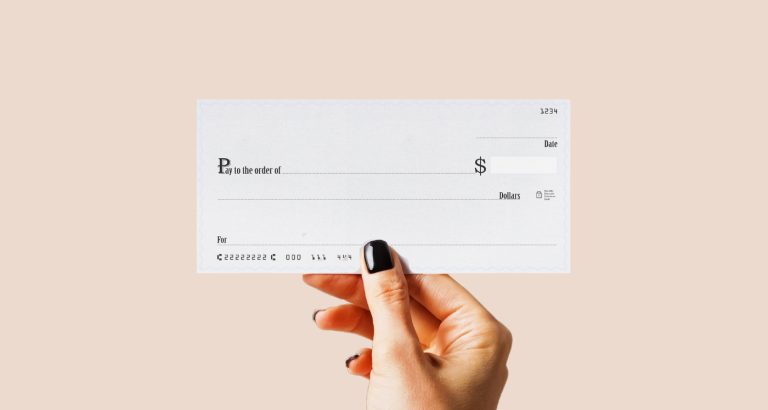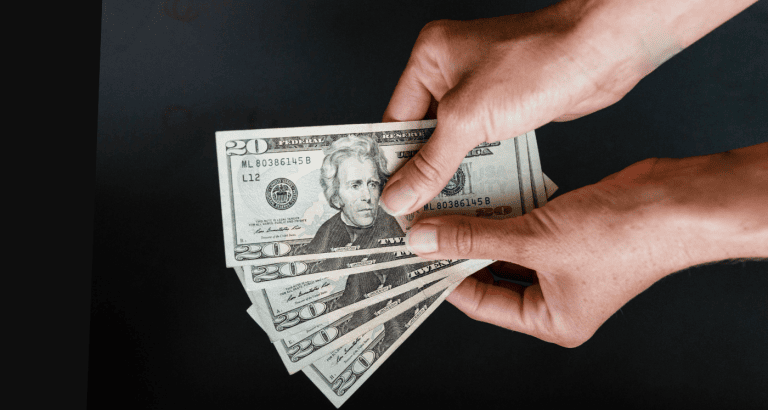10 Ways to Deal With Financial Anxiety
Taking care of your finances is wise. But sometimes, this can be hard to do.
Financial anxiety can cause strain in your life that makes it challenging to accomplish your goals with saving, budgeting, or making money.
But what is financial anxiety? How and what can you do about it?
What is Financial Anxiety?
Financial anxiety is a fear that surrounds things involving money. It can make it challenging to do anything financially and has multiple causes.
As an affiliate partner of various brands and sponsored content, HerPaperRoute may earn commission on qualifying purchases. Disclaimer | Advertise With Us
It can interfere with your life in many ways and make the topic of finance extremely difficult, though it doesn’t always mean you don’t have enough money. The concern can be related to other things entirely.
Financial Anxiety Symptoms
So…financial anxiety is real. Sure, everyone has concerns sometimes over a considerable expense or bill.
But there are specific symptoms of this fear that can tell you if you suffer from this or not.
Hoarding
Hoarding is a pretty apparent symptom. If you hoard money, you can probably quickly tell that you’re doing so.
Now, there is a difference between saving money and hoarding it. Saving money is good, but it can cross over into hoarding when it becomes a negative situation where you cannot spend your stockpiled cash or are extremely concerned about losing any of it.
Overspending
Wait….what? Doesn’t overspending seem like a symptom of someone without financial anxiety?
Not necessarily. Overspending can be a symptom of money concerns.
In fact, overspending may be a way of staying in denial about economic realities or trying to escape the stress and nervousness of money worries.
Obsessively frugal
Looking for ways to save is one thing. Being frugal to the point of obsession is another.
You may be obsessively frugal if you have trouble parting with money for any reason and are highly concerned about spending any of it, even on something very important to you. This is a sign that you feel anxious about money.
Related: Frugal Living Tips from the Tightwad Gazette
Depression
Depression may be related to money worries. It’s unhealthy to live in this sort of state, so it’s best to see a counselor or therapist when feeling depressed about finances. After all, mental health and money are closely linked.
Uncomfortable talking about money
Do you have a hard time talking about money, even with people close to you, such as a spouse? This can be a sign of financial anxiety.
Trying to avoid the subject altogether may be caused by feeling worried about it. This may be from a lack of knowledge or because you don’t want to deal with the problem. No matter what, it’s time to learn how to move past the uncomfortable.
Related: Easy Steps for Getting on the Same Financial Page as Your Spouse
Inability to make money decisions
If you are paralyzed about finance and unable to make decisions, you might be feeling more worried about it than you know. If you cannot decide how to spend or save or have challenges with simple things like budgeting, it might be time to admit you’re stressed.
Perhaps you’ve even made bad financial decisions in the past that are leading to your current financial anxiety.
Health problems related to stress about money
If worry about money is an underlying concern in your mind and you are experiencing stress, you may have financial anxiety. Symptoms of financial anxiety include headaches, insomnia, and high blood pressure, in addition to other things.
Being too generous when your own finances aren’t stable
If you often give away money or buy things for others, even though you may not have enough for yourself, this is also a symptom. Be cautious of giving away too much without a solid plan for your own money.
Uncomfortable having too much money
Do you feel weird about having too much money? Does it cause you concern or unease?
Maybe you are unsure of what to do with it. You may have a symptom of financial anxiety.
If you are doing well financially, it may seem that you wouldn’t have any issues with this, but it’s totally possible.
Guilt or shame about money
Guilt and shame about money can come from many sources. If you feel embarrassed when discussing money or have guilt or shame associated with it, this can cause stress.
It may make you not want to think about finance, which can make things even worse and be a symptom of financial anxiety.
What Does Financial Anxiety Look Like?
So all of the above are possible symptoms of financial anxiety, but what does it look like in real life? What should you look out for and pay attention to?
Being afraid to look at your bank account.
If you avoid looking at your bank account, this is a sign that you want to avoid the thing that is bothering you – money.
You may be concerned about seeing a low number in the account, or it may be unrelated to that and have more to do with your feelings about money in general. If you find it challenging to check your bank account, this is a real-life sign that you are facing a struggle.
Not wanting to deal with money.
Avoiding money is a big sign of financial anxiety. No matter your circumstances, if you refuse to deal with them, you set yourself up for problems later on.
You may not want to deal with money because you think you don’t have enough. Or maybe you have savings but are paralyzed about making the wrong decision about what to do with them. The main problem is that you cannot talk or think about your finances.
Continually worrying about money.
A thought of concern here and there may not be a big deal. But if you wake up at night with thoughts of financial disaster or find that money is in your head all day, even when you should be focused on other things, you may be experiencing worry.
Do I have enough? Do I have too much? Am I handling money right? If thoughts like this swirl through your head more days than not, it’s time for a change.
Related: How to Help Friends & Family with Financial Problems Without Sacrificing Your Well-Being
How Do You Stop Financial Anxiety?
Enough is enough. If you’re tired of out-of-control thoughts and want to begin to view money more positively, these ideas can help.
1. Know that you aren’t alone.
One of the worst things when feeling anxious is the idea that you are on your own and no one else is facing struggles similar to yours. This is simply not true.
Many people struggle with financial anxiety in some form, at some point in their lives, if not currently. It can take many different forms and have various symptoms, but it is still there.
Once you realize that other people face the same struggle as you, it may remove some guilt and concern. It can help you breathe easier knowing that others have faced this problem and overcome it, and you can, too.
2. Get counseling – financial and personal if needed.
Counseling can be beneficial. If you feel like your problems are just too big to handle alone, or you feel overwhelmed by them, consider speaking with a professional who can help guide you in the right direction.
Find someone you can connect with well who is well prepared to help you with finances and anxiety.
3. Ask for help.
Is it hard to do? Yes. Is it necessary? Absolutely. Tell someone you trust what you’re dealing with.
You might choose a spouse, a family member, or a close friend who is a good listener and won’t judge you. Tell them how you’re feeling and ask for advice if you want.
It may also help to read books or articles on the subject to see what information you can find to aid you.
4. Set financial goals.
If you’ve been unable to make decisions about money, have no savings, or too much due to financial anxiety, it’s time to set some financial goals. Decide on one or two things to save up for, begin building an emergency fund, or make it a goal to create a weekly budget.
Your financial goals will vary quite a bit depending on you, but whatever they are, make a plan and go for it. One of the challenging parts of feeling overwhelmed about money is feeling unorganized or not having a plan, and you can change that.
5. Build a reasonable budget.
Depending on your personality and salary, you may have a budget that is way too strict or non-existent. Either way, it’s time to build a budget that is not only reasonable but works for you and your lifestyle.
If you’ve been obsessively frugal in the past, saving won’t be a problem for you. But consider creating a fund just for buying fun things or saving up to do something you want to do, like take a trip.
If you were an overspender before, it might be time to cut back on some of the spending and focus on your savings for the time being. Tailor your budget to what you need most.
6. Manage your debt.
Debt can be a colossal stressor in our lives, and the sooner it’s gone, the better. Making a plan to manage your debt will probably bring some immediate relief to your situation.
Figure out how much you owe and get organized about a time frame to pay it off. Stick to your plan after deciding how long it will take you to pay off your debt.
And if you find you can pay it off sooner, do so. It will lessen your financial anxiety and help you feel in control of your money.
Related: 21 Creative Ways to Pay Off Debt
7. Get financial accountability to check in with regularly.
No matter if you are an over or under-spender, or if you have ignored money troubles for far too long – it’s time for financial accountability.
Ask a trusted friend or mentor to help you. Tell them your money goals and ask them to check in with you regularly to make sure that you’re meeting the goals you set for yourself.
Set a regular time to meet and discuss how you feel and how things are going financially. It doesn’t have to be all the time. A monthly coffee meeting should work well, to start.
8. Don’t compare yourself to others.
Comparison is a killer of peace and can make you feel that you don’t measure up – no matter how great you are.
If you see someone with millions of dollars or a huge salary, it’s hard to not compare. But going down that road is going to be a frustrating experience, and it won’t help your finances.
Instead of comparing, stay focused on your own bank account and life. Know what you want for yourself, and spend your time and energy working on that. Do this instead of looking to others and their lives for inspiration.
9. Know the triggers and train your mind to react appropriately.
You can choose how you think about money. Begin by understanding what triggers you to have financial anxiety.
A big purchase? A lack of knowledge? Whatever it is, train your mind to react healthily when you feel overwhelmed instead of spiraling into anxious thoughts.
Try saying things like, “I made a mistake by buying that, but I can make a plan to pay it off quickly. It won’t be a long-term issue.”
Or, “I know I feel scared about spending money, but I’ve saved for this purchase and am following my goals. This is not only an okay thing to do; it’s a positive and healthy choice.”
Acknowledge your concern, then quickly move on to positivity and solutions instead of dwelling on the negative.
10. Be willing to examine bad habits and correct them.
It can be tough to admit when we have bad money habits. But knowing what to work on is part of growth.
So be willing to examine any bad habits and then take the necessary steps to correct them. It’s okay to have money struggles and admit to them.
Then, you can find a way to move forward and do better in the future. Check out these 11 wealth-building habits to replace them with instead.
Financial Anxiety is Real, But it Can Be Conquered.
Yes, financial anxiety is a real thing, and it is possibly more common than you think. But even if you notice symptoms in your life, know that there are ways out of it.
You can conquer it through working with a skilled professional, asking for help and accountability, making plans for your money, and changing bad habits to good ones.
You are totally capable of overcoming financial anxiety and having a happy and positive relationship with money.









![How to Move Out at 18 [Financial Must-Do's] 7 How to Move Out at 18 [Financial Must-Do’s]](https://herpaperroute.com/wp-content/uploads/2022/04/How-to-Move-Out-at-18-768x410.jpeg)
![Why Is My Debit Card Declined? [Plus, How to Fix Deactivation] 8 Why Is My Debit Card Declined? [Plus, How to Fix Deactivation]](https://herpaperroute.com/wp-content/uploads/2022/04/Why-Is-My-Debit-Card-Declined-768x410.jpeg)
Thanks for these tips. I like that you’ve mentioned not to compare ourselves to others, which is so easy to do. We all have our unique financial situations and getting help when we need it is crucial- without comparisons.
Thanks so much for this post!